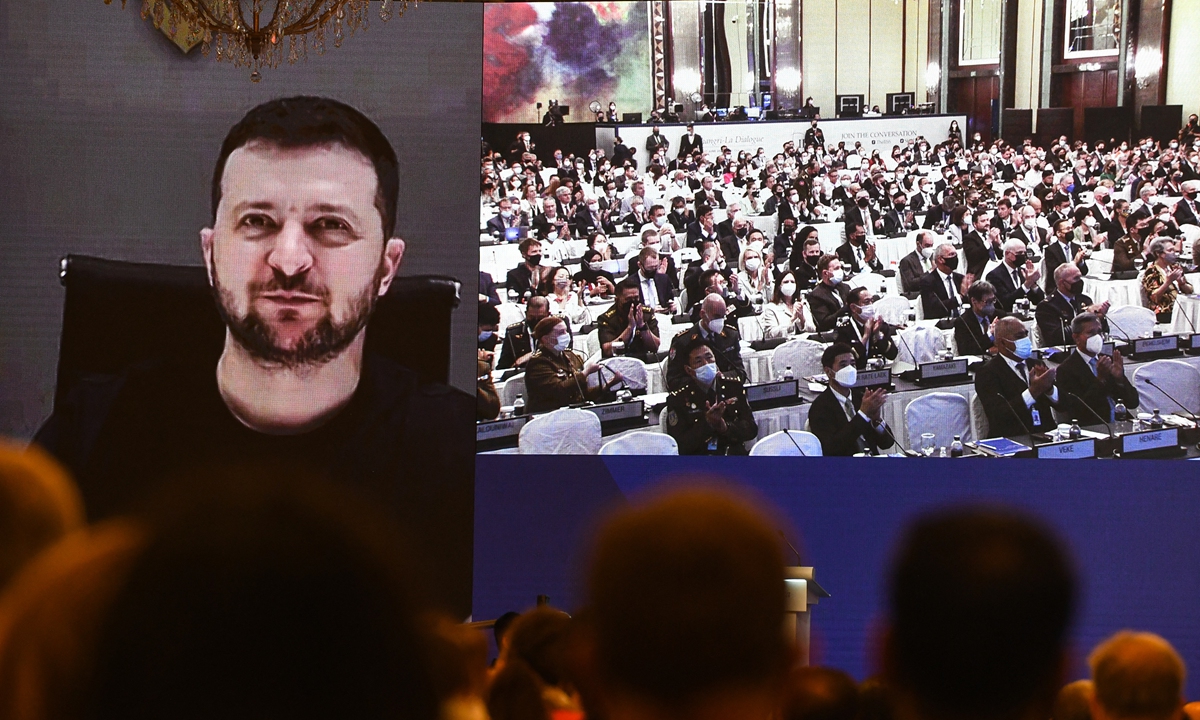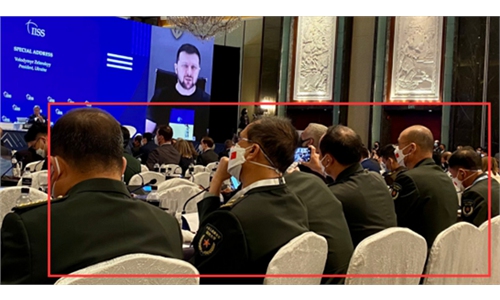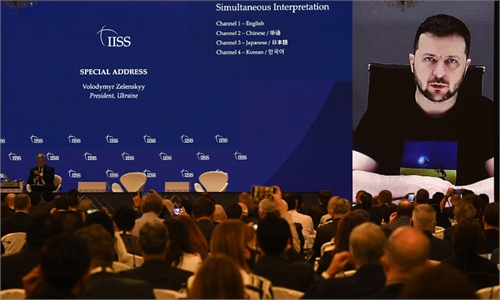
Ukraine's President Volodymyr Zelensky (on screen) addresses participants at the Shangri-La Dialogue summit virtually via a video link in Singapore on June 11, 2022. Photo: AFP
A recent media drama surrounding Ukrainian President Volodymyr Zelensky and the Taiwan question at the Shangri-La Dialogue once again showed how low some US media outlets like the Washington Post can be in order to spin anti-China public opinion.After Zelensky's video address at the event on Saturday, Washington Post columnist Josh Rogin took the chance to raise a misleading question for the Ukrainian president: "How do you recommend that Taiwan stand strong as China seeks to impose its control over a free people, by force if necessary?"
It is no surprise Rogin asked such a question, as the "Ukraine today, Taiwan tomorrow" comparison has recently been hyped by Western media. Zelensky gave a seemingly vague answer. He did not mention "China" or "Taiwan" once in his reply, only emphasizing the importance of taking the "diplomatic way" preemptively before a war starts.
It is a cautious answer to the Taiwan question. In terms of selecting the words, Zelensky was much more prudent than many American politicians. Zelensky understands the issue concerns China's core interest and didn't fall for the trap set by Rogin.
But Rogin still published an article with the headline "Zelensky calls for international support for Taiwan before China attacks" in the Washington Post. As of press time, this patently false headline was still on the website of the newspaper.
Rogin is apparently very familiar with using disinformation to create a sensation. He tweeted four times in a row about the article and retweeted it three times.
According to Lü Xiang, a research fellow at the Chinese Academy of Social Sciences, Zelensky, despite his lack of full knowledge of the Taiwan question, has managed to not fall into Rogin's trap. "In contrast to Rogin's understanding, Zelensky is tactfully criticizing the US and the West for constantly engaging in provocations before the war instead of giving Ukraine any substantial assistance," said Lü.
With ill intentions, some US media outlets have taken any opportunity to link the discussion of the Ukraine crisis to the Taiwan question. They want to fake an impression that some other nations share a similar position with Washington on the Taiwan question. Only in this way can they justify the US' upgraded provocative actions toward the Chinese mainland over the Taiwan question - and, therefore, continue with their reckless moves.
The US propaganda machines are trying to make Ukraine a US accomplice on the Taiwan question. But most countries know that the Ukraine crisis is different from the Taiwan question. One prominent difference is that Ukraine is a recognized independent sovereign state, regardless of its historical disputes with Russia, while Taiwan is not. Taiwan authorities can only be considered a separated regime in the unfinished Chinese civil war, Lü explained.
While looking for "supporters" on the Taiwan question, some Western media are attempting to sow discord between Beijing and Kiev as well. They would probably like to see China heavily criticize Zelensky after his remarks so that Ukraine would become completely on the opposite side of China.
Except for a few Taiwan media, Zelensky's comment on the Ukraine-Taiwan comparison hasn't been extensively reported by global media. Such a gimmick of these media is not new to the world. And the smart-alecky US propaganda machines cannot manipulate China-Ukraine ties. At the end of the day, these lie-spreaders serving the political interests of the White House will only be mocked and despised by even more people.


